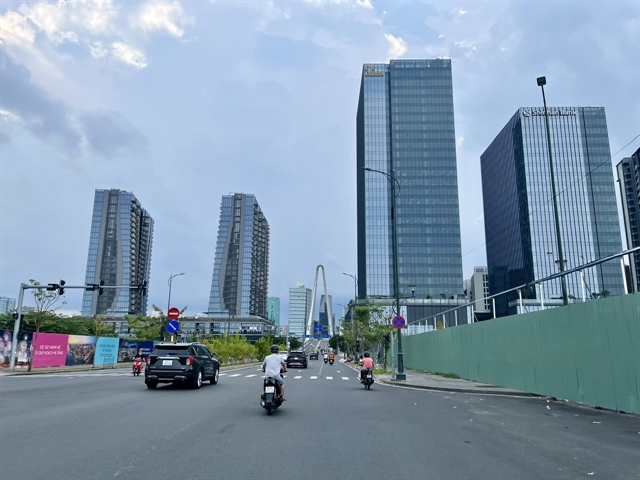 Economy
Economy

 |
| New high buildings in theThủ Thiêm New Urban Area in HCM City. VNS Photo Bồ Xuân Hiệp |
Việt Nam's Finance Ministry has proposed a sweeping new tax regime that would impose a 10-20 per cent levy on profits from real estate transactions, raising concerns among investors and experts who warn it could erode earnings, freeze the secondary market, and slow the sector’s fragile recovery.
Stipulated in a draft amendment to the Law on Personal Income Tax, the proposal seeks to replace the current flat 2 per cent tax on property sale prices with a 20 per cent tax on actual profits, which is defined as the difference between the selling price and the original purchase price, minus related expenses.
If the purchase price or associated costs cannot be verified, the tax would instead be calculated based on the sale price and duration of ownership, with progressive rates ranging from 2 to 10 per cent.
The proposed tariff aims to discourage speculation and bring more fairness to the tax system. However, critics say it may create unintended consequences, especially in a market still recovering from a prolonged slump.
Phạm Danh Tiếng, an investor in HCM City, said he purchased a land plot in An Phú Đông Ward for nearly VNĐ3 billion in early 2023, and now he is going to sell it for VNĐ3.6 billion (US$136,870). After costs, his profit is about VNĐ500 million ($19,000).
“If the 20 per cent capital gains tax takes effect, I’ll lose another VNĐ100 million, which is nearly equivalent to a year’s interest payments on my bank loan,” he said, calling the tax “too harsh” for individual investors.
Vũ Văn Thái, another investor in Gia Định Ward, said that under the new system, selling his VNĐ4 billion property after less than two years of ownership could cost him VNĐ400 million in tax, which is five times the current rate.
“Not everyone who sells quickly is speculating,” he said. “This approach penalises people who genuinely need to sell.”
Based in Phú Mỹ Hưng urban area in southern HCM City, investor Lê Kiều Hạnh, said the value of her high-end apartment had only marginally increased since 2021. After deducting brokerage, furnishing, and loan costs, her net profit was minimal.
“If I have to pay tax on this small gain, I’ll barely break even,” she said.
Many investors say that real estate is a legitimate and risky investment channel, and excessive taxation could deter participation, especially among smaller players.
Better data infrastructure needed
Tax experts agree that taxing actual profits is more equitable than the current method, but warn that implementation could be complex due to Việt Nam’s limited real estate data and common use of under-declared transaction values.
Đinh Minh Tuấn, Southern Region director at Batdongsan.com.vn, said costs like brokerage fees, home upgrades, and loan interest often lack valid documentation, disqualifying them from tax deductions.
“Without clear guidelines, many taxpayers could be overcharged,” he said.
Lawyer Nguyễn Minh Trung in HCM City said that while progressive rates were reasonable, the process must be simple and transparent to avoid disputes or tax evasion.
Trung urged authorities to accept a variety of expense documents, not just official VAT invoices, to reflect actual costs.
Real estate brokers also raised concerns about liquidity. A major brokerage in HCM City said individual investors made up 70 per cent of secondary market activity and that higher taxes could prompt many to pause or cancel deals.
Nguyễn Văn Đính, chairman of the Vietnam Association of Realtors, warned that a high capital gains tax would discourage resales, slowing capital turnover and impacting both the secondary and primary markets.
“If secondary transactions stall, the primary market will suffer too, because investors can’t sell existing assets to reinvest,” he said.
Experts also warn of broader economic impacts, including potential ripple effects on banks, developers, and the financial system, especially if small investors exit the market en masse.
Ministry's response
In response to the backlash, the Ministry of Finance said the proposed new tax regime would require a gradual and coordinated rollout, aligned with reforms to land, housing, and digital infrastructure.
The ministry emphasised the need for a transparent, integrated property database and digital platforms that streamline tax declarations and support proper valuation.
It argued that taxing profits would better reflect economic fairness and, in some cases, might reduce the tax burden, especially where profit margins are thin or losses occur.
The 2 per cent flat tax on sale prices currently applies regardless of actual profit or loss.
Internationally, capital gains taxes are used to combat speculation and housing bubbles. Some countries adjust rates based on how long a property is held or how frequently it is flipped—approaches the ministry is studying.
The draft law amendment is under public consultation, and officials said they would continue gathering feedback and reviewing international best practices before submitting the final version to the National Assembly. VNS

.jpg)


